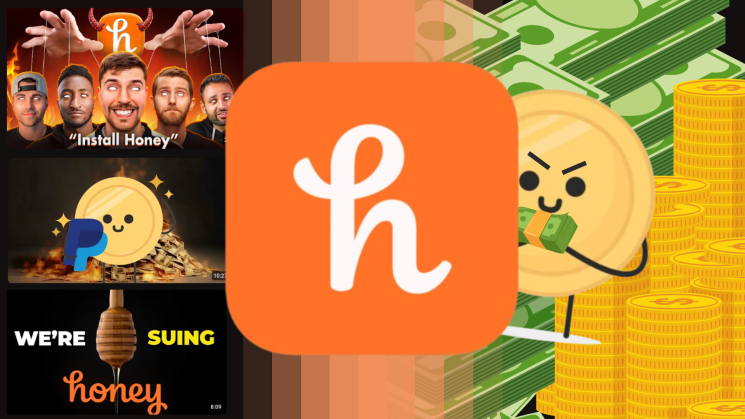
By Vaughn Bui
Honey, a browser extension advertised to save by automatically searching for and applying coupons to consumers at check-out, faces a class-action lawsuit after claims argue that the PayPal-owned extension pockets money intended to go to content creators.
YouTuber MegaLag, known for his investigative videos, initiated the accusations in his video “Exposing the Honey Influencer Scam” posted in December 2024. A week after and following millions of views, lawyer and YouTuber Devin Stone of the channel LegalEagle and the law firm Eagle Team filed a class action lawsuit on behalf of the creators affected, outlining his reasons in his video, “I’m Suing Honey”.
When businesses sponsor creators, they use promotional codes and affiliate links to direct customers to product pages. These codes and links are typically placed in the description box of videos to reach viewers. When customers use these affiliate links and codes, the creator would receive a small commission for bringing the customer to purchase from the business.
However, in his video, MegaLag alleges that Honey “swipes” and pockets the commissions intended to go to the creators that promote the browser extension. With Honey being one of the most prominent sponsors of creators throughout social media, having over 18 million users on Google Chrome alone, stolen commissions suggest huge losses for creators who rely on the commissions for passive income.
“[We have] filed suit on behalf of all content creators and businesses who have been harmed by PayPal Honey. Because there are so many people, we filed a class action lawsuit seeking damages in the form of the money that we believe Honey prevented from reaching creators so we can give it back to creators,” Stone said.
The lawsuit is being argued over affiliate links and stolen commissions. When the purchase is made, the website pays an appropriation to that affiliate. The website knows who “guided” that buyer by looking at the last affiliate link clicked before purchasing.
“For example, you might click on a shoe blogger’s affiliate link for a pair of Nikes, but you don’t buy it right away. Later, you click on a YouTuber’s link for the same shoes and complete the purchase. In this scenario, the YouTuber gets the commission and the blogger gets nothing,” MegaLag said.
How Honey works is that before the check-out button is clicked, Honey would pop up a small window on the user’s screen to search for discounts. Accusations made by MegaLag state that when the user clicks to remove the pop-up, the last click on that website would be Honey and all commissions would therefore be given directly to Honey.
In his video, MegaLag makes a comparison between how Honey “swipes” commissions and how television sales work. He describes that when a department store salesman helps you find a TV, they offer a referral card so that the store knows to appropriate that worker. However, before you purchase, another salesman entices you by asking if you’d like to use any coupon codes he may have. While the salesman is “searching,” he switches the department store worker’s referral card with his own card; the store then appropriates the coupon salesman for the purchase without you knowing.
Additional claims argue consumers are also affected by shady business practices as Honey supposedly does not provide discounts, directly going against their advertising. In his investigations, MegaLag has commonly found that Honey does not provide discounts on purchases, even when coupons are online and usable. He argued that Honey makes deals with the businesses they partner with and those partners may limit certain coupon codes from being used.
“[Businesses] are given full control over which coupon codes go live on the platform if any at all … it allows businesses to control which coupon codes are shared with customers,” MegaLag said.
MegaLag stated there will be two more videos further explaining the “Honey Trap” as he calls it in his video. Having gained over 16 million views on the first video alone, YouTube creators and communities have been in an uproar ever since. Many creators have uploaded videos with their own thoughts regarding the situation, showing the extent to which Honey’s shady practices have gone unnoticed.
Marques Brownlee, a popular technology YouTuber having amassed over 19 million subscribers, spoke about Honey in his video titled, “The Honey Scam: Explained”. Brownlee had previously worked and been sponsored by Honey numerous times.
“If I had known any of this I never would have worked with Honey and neither would the creators who did. But, clearly, nobody knew about this going on,” Brownlee said in the video.
Honey has also sponsored creators in the gaming industry, including the most subscribed gaming YouTuber, PewDiePie, in his video unboxing his 100 million subscribers trophy.
“I’m confident this might just be the biggest influencer scam of all time, which is insane considering Honey is owned and run by PayPal, who purchased the company for $4 billion,” MegaLag said.
With the lawsuit and influx of videos criticizing Honey, PayPal’s VP of corporate communications, Josh Criscoe, has made a statement through an interview with The Verge.
“We dispute these allegations in the lawsuits, and will defend against them vigorously…Honey follows industry rules and practices, including last-click attribution which is widely used across major brands.” Criscoe said.
It is currently unknown about further dates and trials regarding the suit. Lawyers from the Eagle Team ask that the dollar amount to be paid be left to the courts to decide.





